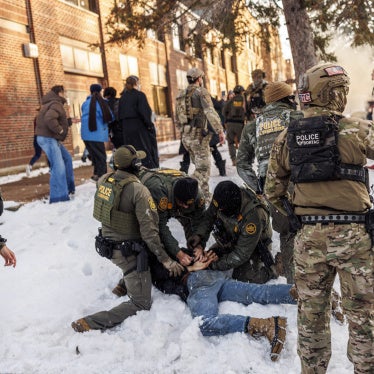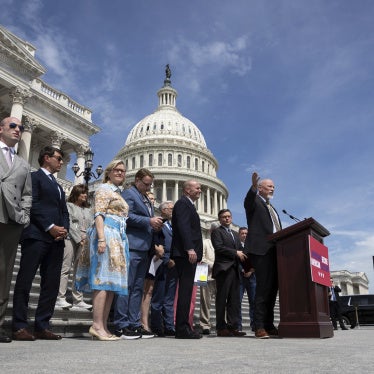Human Rights Watch appealed to the governors of North Carolina and Oklahoma today to halt two executions scheduled for December 10, International Human Rights Day.
Human Rights Watch asked that both death sentences be commuted to life in prison."The execution of these two men on a day that is set aside to celebrate human rights shows how out of step the United States is with the rest of the world on the death penalty," said Wendy Patten, U.S. advocacy director for Human Rights Watch.
The two men scheduled to be executed on December 10 are Desmond Carter and Jerry McCracken, both age 35. Carter was convicted for the murder of an elderly neighbor and is set to die by lethal injection in North Carolina. McCracken, who was convicted of four murders, is scheduled to be put to death in Oklahoma.
Serious questions persist regarding the fairness of the death penalty systems in North Carolina and Oklahoma. A study by the North Carolina Council of Churches concluded that racial factors played a large role in determining who received death sentences, finding that defendants who murdered white victims were 3.5 times more likely to be sentenced to death than those who killed black victims. Defendants in North Carolina also confront a lack of qualified court-appointed counsel to handle their cases. According to a recent study by the Common Sense Foundation, a North Carolina policy group, one out of every six death row inmates was represented at trial by lawyers who were, at some time, disciplined by the North Carolina State Bar. After a lengthy hearing on December 4, a state court judge stayed Carter's execution and ordered a hearing to consider claims of racial bias and inadequate representation, but the state Supreme Court overturned the judge's ruling and lifted the stay in a cursory opinion issued on December 6.
Inadequate legal representation has also plagued Oklahoma's death penalty system. Oklahoma has one of the highest execution rates in the country, with 0.145 executed per 10,000 people. In 2001, Oklahoma executed more prisoners than any other state. Numerous capital defendants in Oklahoma have been represented by court-appointed lawyers who failed to present witnesses and mitigation evidence and, in some instances, failed to make opening statements.
"These cases highlight problems endemic to the death penalty, including racial bias and lack of adequate representation," said Ms. Patten. "Many U.S. states continue to carry out death sentences despite serious concerns about fairness."
Human Rights Watch continues to urge the abolition of the death penalty in the 38 U.S. states that retain it. Human Rights Watch is especially concerned about the execution of juvenile offenders. The United States continues to apply the death penalty to children in clear violation of international law. In the past three years, only the United States, Congo and Iran have executed juvenile offenders - children under 18 at the time they committed the crime - and the latter two countries have since explicitly repudiated the practice. In 2002, only the United States is known to have put child offenders to death, with three such executions in Texas this year.
Human Rights Watch opposes capital punishment in all circumstances. The death penalty is a form of punishment unique in its cruelty and finality. The intrinsic fallibility of all criminal justice systems assures that even when full due process of law is respected, innocent persons may be executed.







